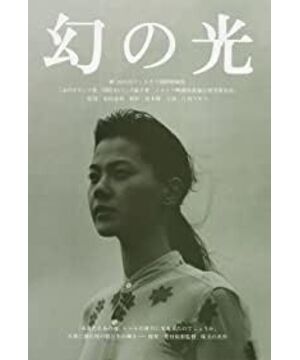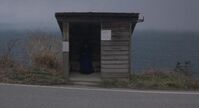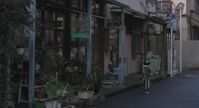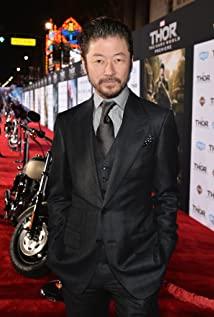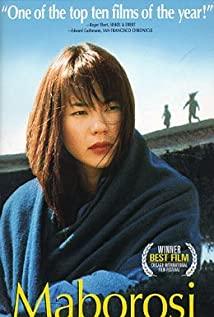The little girl looked in the mirror and heard the bicycle bell ringing outside the wall behind her, and turned around.
This is the first shot of Hirokazu Kore-eda as a feature film director to show the world his continuous picture of the Japanese family in the future: the individual looking inside, the tension of the estranged space, and the concise and restrained language of the shots. Although the debut work "Light of Magic" has a sense of form that cannot be hidden compared with subsequent works, the bond between narrative and emotion is not close enough, and even has a rather obvious Taiwanese accent, the delicacy and mellowness of the style of "Shizhi", and The incisiveness of exploring intimacy between people has been fully expressed.
The little boy who rides the bicycle rattle becomes the girl's husband, but there will always be a wall in the future: disconnecting the line of sight but unable to resist the incoming sound. Sound, whether from radio waves, metal, liquid, or even wind, constitutes the film's auditory narrative connection. After they got married, the widowed old man raised the volume of the radio on the other side of the wall. The husband thought it was a "representation that he was still alive", but in the end, the husband chose to commit suicide on the railroad tracks. After the remarriage, there are no widowed old people on the other side of the wall. Instead, the voice of the sea, the voice of the storm, the endless narration of eternal existence. This has to make people think about the last scene of the film: the sea is outside the window, and there are pen and paper on the table under the curtain. No mirrors, no girls. This may be a hint of Yumiko's suicide. She went after the voice and returned to her ex-husband's arms, because she couldn't figure it out and couldn't stand it.
People in this space are always attracted and entangled by another space that separates them, and they can't let go for a long time. This apparent helplessness and contradiction has almost become fate. Inside, outside; this, that; life, death. Grandma is here, but stubbornly wants to die there, in her hometown. After the opening scene, Yu Fu rides into the picture from the end of the highway where grandma left - did he come from grandma's world? This shot is already implying death. Riding a stolen bicycle, surrounded by a train heading into the distance that will never catch up, and the whistling sound of hunting shrouds the unchanging life-hasn't the boy who was riding a bicycle since he was a child never hoped for the distance? Although the film did not explain, I tend to think that Yu Fu's suicide was also caused by a distance. There is death and there is life. The swaddling child and the absent father, the more important thing should be the strong shadow of death here, so Yumiko decided to leave and go to a distant place.
Life in a seaside town can't but be said to be peaceful, peaceful, and nothing to complain about. Even Yumiko, who was always dressed in black, changed into a red dress and stooped to work on the sunny stairs. If we remember Yumiko combing her husband's daughter's hair in the previous scene, and the red schoolbag that her daughter carried when she went out later, we can understand that the contrast of clothing colors here implies the harmony of the relationship between the characters. The use of colors here is really smarter than when a son sees his stepfather planing logs into a rectangular shape with a chainsaw; the logs felled outside the door and the bitter appearance of the child covering his ears in the indoor work scene, suggesting that this is a kind of innocence. Pleasant to do as the locals do, admiration or growth is a chisel of character.
Compared with her son, when describing Yumiko's psychological transformation, the use of language in this debut film is not ingenious: after the picture of working in a red dress, the scene of humming without a sound source skips the quiet seaside town empty frame by frame. The mirror finally fell back to the fan in the city, and the audience realized that the humming came from a naked man and woman leaning against the window in only their underwear. After discussing "I was really scared by the cold here when I first came", Yumiko got up and issued a new round of sexual requests. The narrative tension created by the transition of the previous separation of sound and picture into the intimacy of this scene is amazing; the red dress worn in the previous labor has a sexual undertone, and this sexual explicitness is related to the heat of the outside temperature and the possibility of coming back at any time outside the window. The fear of her child constitutes an obvious "abnormal state" - how hearty this moment is, how cold the winter is at that time; how hard Yumiko is entering the life of Dasein at this moment, then when it is an old thing How traumatized she was when it hit.
This "climax" picture has become the central axis of the whole film. The next train, mother, neighbors, street car bells, staring through the window again, coffee shop, refusal to her husband's suggestion when she got home (light bulb), old lady who has not returned from the sea, curled up alone in a cramped The platforms... all constitute an exact counterpoint to the previous plot. It is worth noting that in the end Yumiko's clothes, turned into blue robes, the color of the ocean. The last time he left the country was wearing a black skirt and a white top. good weather. In the fixed shot from the inside out, Yumiko and her father-in-law are talking about the same topic, but they are separated by the doorpost, and the picture is divided into two. In the side mirror under the eaves of the back porch, there is no dialogue, Yumiko and her father-in-law look at the sea together, the wind blows their hair. This is Yumiko's last shot. I think she and her father-in-law stared at death together, maybe they chose a different attitude.
Although my friend said that the last picture hinted at Yumiko's departure, I still pessimistically believe that she is "going" - where else can she go? That funeral did not heal any heart robbery. Walking with the funeral procession in the long and narrow sea "tunnel" between heaven and earth in the picture, although Yumiko stopped halfway, the later footage told her that she had been following the procession, standing at the cremation site until the people dispersed, letting the smoke spread freely.
Therefore, this debut work seems to be discussing that people's knots cannot be relieved no matter what. But the remarry husband and father-in-law seem to have found a way to continue their lives: suppress their crazy love, and even marry another term after the death of their wife instead of marrying her. This blank space is the same as my father-in-law who has been hiding behind the wave-absorbing block to smoke, and it constitutes a thought-provoking dark corner of life in the film. At that time, director Zhi was not skilled enough to incorporate it into the discussion scope of the entire film.
View more about Maborosi reviews


